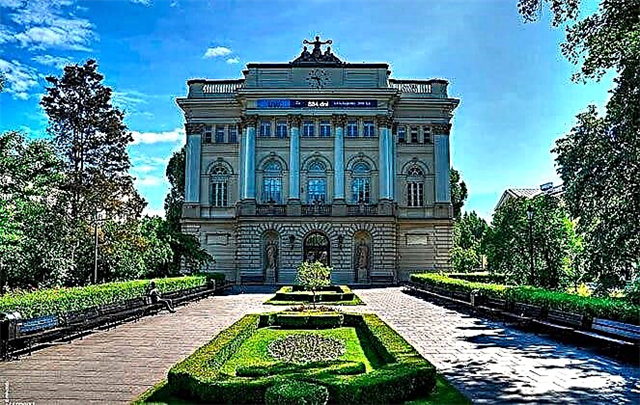Kidney cancer is a fairly common and life-threatening disease. In recent years, there has been a tendency for an increase in the number of patients with this disease in developed European countries and the United States. Kidney cancer is one of the most common malignant tumors today, along with neoplasms of the thyroid and prostate glands. Based on modern methods, the treatment of kidney cancer in Germany gives reasonable hope for a cure for those suffering from this serious disease.

Medicine in Germany today
Germany has a very long tradition in the natural sciences, in particular in the field of medicine.
Medical science was studied at a high level in the leading German universities, both Catholic and Protestant in the cities of Göttingen, Wittenberg, Heidelberg and others. The country has a track record of introducing health insurance into its social security package since the Bismarck Empire.
Today, a comprehensive strategic program for the development of medicine, health care and social infrastructure has been developed here, within the framework of which high-quality medical care is available to almost all citizens of the country.
Developed in Germany and the sphere of medical services that are not included in the social package, which includes fitness, plastic surgery, and so on.
Methods for the diagnosis of kidney cancer in Germany
It all starts with a medical examination. After examining the patient's complaints and examining in detail his appearance, the doctor can draw many important conclusions and build the correct strategy for examination and treatment.
Then comes the turn of laboratory research. Blood and urine are taken for analysis. In addition to general indicators, special attention is paid to the so-called tumor markers - specific substances that can indirectly indicate the presence of a cancerous tumor in the body.
Scintigraphy is also used in German clinics. The essence of the method is that the examination begins with the introduction of radioactive isotopes into the body. A computer then captures the rays emitted by these substances, which provides a two-dimensional image on the screen. The examination helps to see the processes of the internal organs that are important for health.
With regard to the kidney, such parts of this organ as the glomerulus and the tubular system are examined first. This allows you to determine the efficiency of each kidney separately.
Doctors can see if the accumulative and excretory functions of the kidney are impaired, and to what extent. Scintigraphy can be indispensable in identifying such a dangerous pathology as, for example, renal artery stenosis (blockage of the main vessel and impaired blood supply to the kidney) and vesicoureteral reflux (reflux of a certain amount of urine from the bladder into the ureters).
Despite the complexity, scintigraphy only takes about 30 minutes.
The following diagnostic methods are also used:
- Ultrasound examination of all abdominal organs. In kidney cancer, the liver is usually the first of all organs to suffer. It is on her that such a dangerous complication as metastases first of all extends. Therefore, ultrasound of the kidneys and other organs located next to them makes it possible to assess the degree of development of a malignant tumor. In addition to affecting neighboring organs, German doctors also look at the extent to which the pathological process has affected the lymphatic system, the vessels of the abdominal cavity, and so on.
- Angiography. Allows, with the help of a contrast agent, to see in detail all the vessels that provide the blood supply to the kidney. Especially medical workers are interested in those vessels that are directly affected by the tumor and therefore supply it with blood. These data are especially important for the successful performance of surgical operations on a diseased organ.
- Computed tomography also involves the introduction of a contrast agent into the body. It allows you to study the tumor in detail: its size, direction of growth, the presence and degree of development of metastases.
- Positron emission tomography is a fairly modern examination method. It is necessary for a comprehensive study of the body for metastases in any organs or lymph nodes.
The high technical capabilities of German clinics make it possible to effectively carry out such an important examination as a biopsy. It consists in taking a part of the affected tissue for examination and studying it in detail in the laboratory.

Stages of kidney cancer treatment in Germany
Renal cancer treatment in Germany is a complex process that includes both complete recovery from the disease and subsequent rehabilitation. It is based on several levels of disease control that combine to achieve maximum effect.
The value of drug therapy
The first and least difficult stage can be considered drug therapy. It is based on the use of modern drugs that delay the development of the disease.
Of course, even in our time it is practically impossible to radically influence the disease and reverse its course using only medication methods. However, in German clinics, it is actively used for the general strengthening of the patient's body, which makes it possible to reduce the negative effect of chemotherapy and serves as a guarantee of successful surgical methods of treatment.
Immunotherapy to fight kidney cancer
Immunotherapy is considered a good adjuvant in the fight against disease. With its help, doctors achieve a qualitative enhancement of the immune forces of the patient's body. And this helps to suppress tumor growth as much as possible.
For these purposes, the patient is injected with drugs (alpha-interferon and others) that enhance the biological response of the body, as well as ready-made antibodies.
Surgical method of arterial tumor embolization
A more cardinal method of treating kidney cancer can be considered the modern technique of arterial tumor embolization. It can be called a gentle alternative to removing the neoplasm. With the help of artificial blockage of the arteries and capillaries feeding the affected areas, the flow of blood into the tumor is blocked, which is why it is gradually resorbed (absorbed). As a result, it is possible to avoid a difficult operation to remove the kidney and associated complications.
Finally, if all other means have been exhausted, direct surgical intervention is applied. This can be a narrowly targeted resection of a small tumor. At the same time, several small cuts are made with pinpoint accuracy, allowing it to be removed.
However, if the size of the neoplasm exceeds 6 cm, doctors decide on a nephrectomy - complete removal of the diseased kidney with all the tissues associated with it. Such a forced measure is resorted to in order to exclude metastasis, that is, the spread of cancerous lesions to other organs, since this will make cure very difficult.
Other treatments for kidney cancer in Germany
In addition to those already mentioned, Germany also uses other advanced methods of fighting kidney cancer. Cryodestruction can be cited as an example - exposure to a tumor of small size (up to 3 cm) with the help of very thin needles at ultra-low temperatures.
There is also radiofrequency ablation, in which a destructive effect on a neoplasm is provided by an alternating current of a high frequency. This method of treatment also makes sense only if the tumor is small.

How to travel to Germany for kidney cancer treatment
Nowadays, there are a huge number of intermediary firms specializing in the organization of treatment in Germany.In this diversity, a person must be very clear about what exactly he needs and in what time frame.
Let us consider in turn what needs to be done by a person who wants to go to Germany for treatment:
- It all starts with a request for the selection of a clinic and an attending physician, for which an application is made, which indicates: name, year of birth, contacts, current complaints. As well as a medical history translated into German or English. The application can be sent by e-mail to the address of the intermediary firm, which will send it to the professor of the selected clinic.
- The approximate cost of treatment is calculated in advance. It is derived from the preliminary treatment plan, which is drawn up by the doctor. Based on this document, the clinic, according to its price lists, calculates the approximate cost of the full treatment. However, it should be remembered that it is almost impossible to predict the exact cost in advance, since the doctor does not even see the patient yet, does not know what the examination will show, how long rehabilitation will take, and so on. Usually, such a preliminary cost estimate is needed to give the client an idea of what level of financial expenses he should be prepared for.
- If the client is satisfied with the amount and he is ready to incur expenses within the specified limits, he will be charged an advance payment, which usually includes the cost of the medical management provided by the company, the organization of travel to the destination and the first consultation with the attending physician. If the patient organizes the trip on his own, the entire cost of the treatment in full is taken from him at once.
- Then comes the turn of obtaining a medical visa and clarifying the timing of treatment. To obtain a Schengen visa, you need an official invitation from the clinic. It is provided by an intermediary firm, for which the client needs to provide documents confirming the payment of the cost of treatment previously declared by the clinic, as well as pay the invoices sent by the company for medical management services. When negotiating with a clinic without intermediaries, the medical institution sends an invitation immediately after paying the full cost of treatment. If you need additional services in the form of a transfer, escort or translator, this is negotiated and paid separately.
- Arrival to Germany. If necessary, the company itself will help you get to the clinic, and will also provide an interpreter during a consultation with a specialist.
- The client's attending physician is the main responsible person at all stages of treatment. He informs the patient about all the dangers and side effects of each of the procedures. The client has the right to refuse any of them at any stage of treatment.
- The clinic makes the final calculation after discharge. Moreover, all calculations can take up to one and a half months, and only after this time the final account will be known. Usually it exceeds the already paid preliminary one, and the client pays the difference by money order.
But it may also happen that the amount of expenses will be less than the declared one. Then, in turn, the clinic compensates for the difference - by transferring to the same client account from which the funds were received by it.
When choosing an intermediary company, in order to avoid possible misunderstandings in the future, it is advisable for the client to check the presence of official registration and representation in the territory of the Russian Federation or the CIS country, the number and level of qualifications of employees, and the availability of translators.
Estimated cost of kidney cancer treatment in Germany
The cost of treatment depends largely on how many tests need to be done during the examination and whether surgery is necessary. An approximate calculation of the cost of diagnostic and surgical services is presented in the table:
| Service | Estimated cost, € |
|---|---|
| Check basis, including ECG, ultrasound, blood test | 850 |
| Business Check-Basis + full body MRI | 1750 |
| MRI (magnetic resonance imaging) of the whole body | 1150 |
| CT (computed tomography) of the abdomen | 1000 |
| Consultation with a urologist, including sonography, urine and blood tests for PSA | 800 |
| Full-body PET (Positron Emission Tomography) | 1450 |
| Kidney resection | 8000 |
Different examinations can be combined, but most of the surgical procedures are alternative to each other. Thus, it can be seen from the table that, for example, the budget for a comprehensive examination followed by a kidney removal operation may well be within 10,000 euros.
German clinics that treat kidney cancer
Among the hospitals that effectively treat kidney cancer, one can distinguish, first of all, such a flagship of German medicine as the Charite Clinic. It is a very old institution with a long tradition of humanism and outstanding scientific achievements.
Today "Charite" is a huge medical complex, consisting of 17 large centers, including about 100 specialized clinics.
Among the members of the medical staff are Nobel Fellows. More information about the clinic can be found here.
The cancer center in Munich has no less experience in treating serious diseases. This large clinical association operates at the Munich University of Technology. Using unique modern equipment, the institution helps patients from all over the world. Today, about 200,000 patients are treated in his clinics.
The Academic Hospital of the University of Cologne is also highly respected in the world of medicine.
Conclusion
Kidney cancer treatment in Germany is a great chance for salvation and a normal life for many seriously ill people. Modern diagnostic methods allow obtaining the most reliable information about the features of the disease and possible complications. Arterial embolization, cryodestruction and other methods of modern surgery provide a real and much less destructive alternative to chemotherapy and removal of the affected organ for the body.
In the process of leaving for treatment in Germany, intermediary firms specializing in medical management can be of great help.











